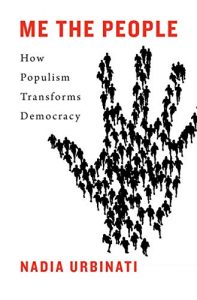In Me the People: How Populism Transforms Democracy, Nadia Urbinati examines populism as a form – and deformation – of representative democracy. This is a rich work, brimming with ideas about the nature of representative government, how we conceive of it and how populism interacts with these, writes Ben Margulies, and is recommended to university students and scholars seeking to learn more about democratic and populist theory.
Me the People: How Populism Transforms Democracy. Nadia Urbinati. Harvard University Press. 2019.
 Populism is more than an ideology or an object of study; it is the news. So it is not surprising that scholars writing about populism face a problem common to journalists: trying to find a new angle on a topic everyone is talking about. For political scientists and other academics, this may be more challenging now that definitions of populism are starting to converge around the importance of the conflict between ‘the [good] people’ and ‘the [illegitimate] elite’. Some academics focus on defining populism as an ideology, like Cas Mudde and Cristobal Rovira Kaltwasser; others, like Benjamin Moffitt, talk about the populist style of communication; while Catherine Fieschi talks about populist epistemology, the ways populists decide what is authentic knowledge.
Populism is more than an ideology or an object of study; it is the news. So it is not surprising that scholars writing about populism face a problem common to journalists: trying to find a new angle on a topic everyone is talking about. For political scientists and other academics, this may be more challenging now that definitions of populism are starting to converge around the importance of the conflict between ‘the [good] people’ and ‘the [illegitimate] elite’. Some academics focus on defining populism as an ideology, like Cas Mudde and Cristobal Rovira Kaltwasser; others, like Benjamin Moffitt, talk about the populist style of communication; while Catherine Fieschi talks about populist epistemology, the ways populists decide what is authentic knowledge.
Nadia Urbinati, who holds a chair in political theory at Columbia University, finds her own perspective in Me The People: How Populism Transforms Democracy. Urbinati examines populism as a form – and perversion – of representative democracy. Her work is an examination of populism as political theory, comparing it to the (idealised) theory of representative democracy that we associate with the ideal democracies of the late-twentieth-century West. Though some of her observations are echoed by other authors, her work stands out for its explanation of democratic theory and the ways populism both fits into and deforms our representative systems.
Urbinati devotes the heart of the book to explaining how representative democracy is meant to work and the political theory that underpins it. Urbinati evokes ‘an interpretation of democracy that has political liberty and pluralism at its core’ (91). In a true democracy, the idea of the ‘sovereign people’, the community of citizens who hold ultimate power and legitimating authority, is a fictio iuris [a legal fiction] (88). The actual body of citizens is an assembly of multiple interests engaged in permanent contestation. Majority rule is a decision-making process that grants one particular constellation of interests the power to govern (which is not the same as sovereignty) for a set period of time, but not forever. Democracy must permit the possibility of a loyal opposition and new, different majorities. Citing Hans Kelsen, Urbinati writes that:
In order for majority rule to avoid violating political autonomy, all citizens must be equal before the law and must have an equal right to determine the politics of the commonwealth and be heard […] they cannot be frozen in any specific social determination, such as ‘‘the few’’ and ‘‘the many’’ (89).
Urbinati distinguishes between deliberation and decision-making in representative democracy. She separates ‘will’ (voting) and ‘opinion’ (assessment and judgment) (7). This is necessary, because it allows the majority to change its shape and change its mind. ‘Representative democracy has an endogenous disposition to generate dissent and conflict along partisan lines; voting regulates this dissent and conflict, but it never resolves it’ (166). In this arena, most actors claim to speak in the name of the people, but they rarely claim that only they can speak for the people, or that they are the people. This would rob democracy of its open-endedness, its ‘indeterminacy’ (92) – ‘the people’ is a symbol that sanctions majority decisions, but has no permanent identity.

Populism is dangerous because it denies and attacks this pluralism. In populism, the majority is no longer a way to make temporary decisions in a diverse society. Rather, the majority becomes the people itself. Urbinati cites Aristotle, who distinguished between majority rule – a way to make decisions – and ‘the regime of the majority’, in which the majority simple governs and ‘does not tolerate opposition and tries to conceal it as much as it can, when it does not liquidate it altogether’ (98). Populists claim that the majority is the people, including the legal sovereign.
This majority is by definition not identical with everyone in the polity. Rather, the majoritarian people are the ‘good’ people who are worthy of holding sovereignty. This is a point Jan-Werner Müller makes in What is Populism?, speaking of distilling a sort of pure people from the body of citizens or nationals. As Urbinati argues, populism ‘makes politics consist in a part that declares itself, as such […] to be at the center of state power, and to claim that it is the “good part” entitled to rule’ (151). Furthermore, populism rules solely in its own interest, ‘pars pro parte’ [‘the part acting for the part’, as opposed to for the whole] (152), and not for all society (also an argument Müller advances).
To summarise, Me the People depicts populism as a machine for collapsing the distinctions that make representative democracy work. It annexes the abstract sovereign to the voting majority, getting rid of deliberation and opposition. It merges the space of opinion and the space of decision, which leaves the people nowhere to gather and assess what the leader is doing. That new demos merges with its leader, and then this composite juggernaut absorbs the state. This also means the erasure of ‘the distinction between ordinary political and constitutional politics’ (133), since the sovereign is the only possible actor.
Urbinati has some interesting arguments and observations about the nature of populist leadership. She rejects Mudde and Rovira Kaltwasser’s claim that populism does not necessarily require a charismatic leader. Instead, she aligns with the camp that argues that populism needs a single leader to embody the homogenous people (120). Furthermore, that leader must never seem like part of the establishment, the elite. Populists are installing new elites, but must never appear to be doing so. Populist leaders avoid this through an unremitting campaign against the never-quite-vanquished elites (124-25).
More intriguingly, Urbinati proposes that populist leaders take advantage of their roles as merely an instrument of the people. Since the leader is just the people incarnated, ‘the leader is never truly responsible, for better or worse’ (128). (Urbinati could have gone on to say that the people, being sovereign, cannot be held responsible either.)
Where did populism come from? Urbinati tends to blame two developments. The first is the erosion of the middle class, again citing Aristotle (102). The other is the rise of what Richard S. Katz and Peter Mair (1995) called cartel parties (see also Mair (2013)). Katz and Mair described how parties sidelined their already declining mass memberships to become professional organisations dependent on state funding in the late twentieth century. Partly because parties had grown weaker, electorates became fragmented assemblies of interest and identity groups and parties had to construct majorities ad hoc through media appeals and attractive leaders. This created an opening for populists, who construct their electorates in similar ways
Me the People is primarily a work of theory, and as such it does not engage deeply with political science literature about specific parties or electoral patterns. This is not a fatal flaw, but it does create some problems. In talking about populism as a largely theoretical construct, Urbinati has no space to really examine one of its most worrying features, which is its tendency to unite with radical right ideologies. In Europe and much of the rest of the world, the populist radical right is often dominant, with its ethnonationalism and authoritarianism. Although Urbinati does discuss the distinction between fascism and populism, we do not see any examination of the broader relationship between populism and radical-right ideology.
Me the People does examine the internal mechanisms of populist parties in some detail, choosing The Five Star Movement in Italy and Podemos in Spain as examples due to her interest in how these parties try to combine internet-based direct participation and competent electoral leadership, which in practice centralises authority in the leadership. However, these examples are not really representative of populist parties or electorates in Europe. The Five Star Movement lacks any clear ideological grounding, while Podemos is left-wing. Many, if not most, populist parties in Europe are radical right and far less concerned with democratic internal procedures.
Occasionally, Urbinati’s definitions feel slightly confused. On the one hand, she describes populism as a mutation or ‘disfigurement’ of democracy. But she also argues that ‘a democracy that infringes basic political rights – especially the rights crucial for forming opinions and judgments, expressing dissents, and changing views – and that systematically precludes the possibility of the formation of new majorities is not democracy at all’ (8). So is populism the negation of democracy or merely its disfigurement? This is not entirely clear and may not be a fully resolvable question.
Me the People is a rich work, one brimming with ideas about the nature of representative government, how we conceive it and how populism interacts with these. Close students of populism will recognise some of these ideas in other works, but this presentation is novel. Unlike What is Populism?, this is not a book aimed at general audiences. But for university students and scholars, Me the People is a good tool for learning about democratic and populist theory, especially if theory is not your area of expertise. I have not been able to summarise all of Urbinati’s thinking here, so if you are intrigued, read the book.
- This article originally appeared at the LSE Review of Books.
- Image Credit: Image by Clker-Free-Vector-Images from Pixabay.
Please read our comments policy before commenting.
Note: This article gives the views of the authors, and not the position of USAPP– American Politics and Policy, nor of the London School of Economics.
Shortened URL for this post: https://bit.ly/37vSYgz
About the reviewer
Ben Margulies – University of Brighton
Ben Margulies is a lecturer in political science at the University of Brighton. He was previously a postdoctoral fellow at the University of Warwick. He specialises in European, comparative and party politics.






